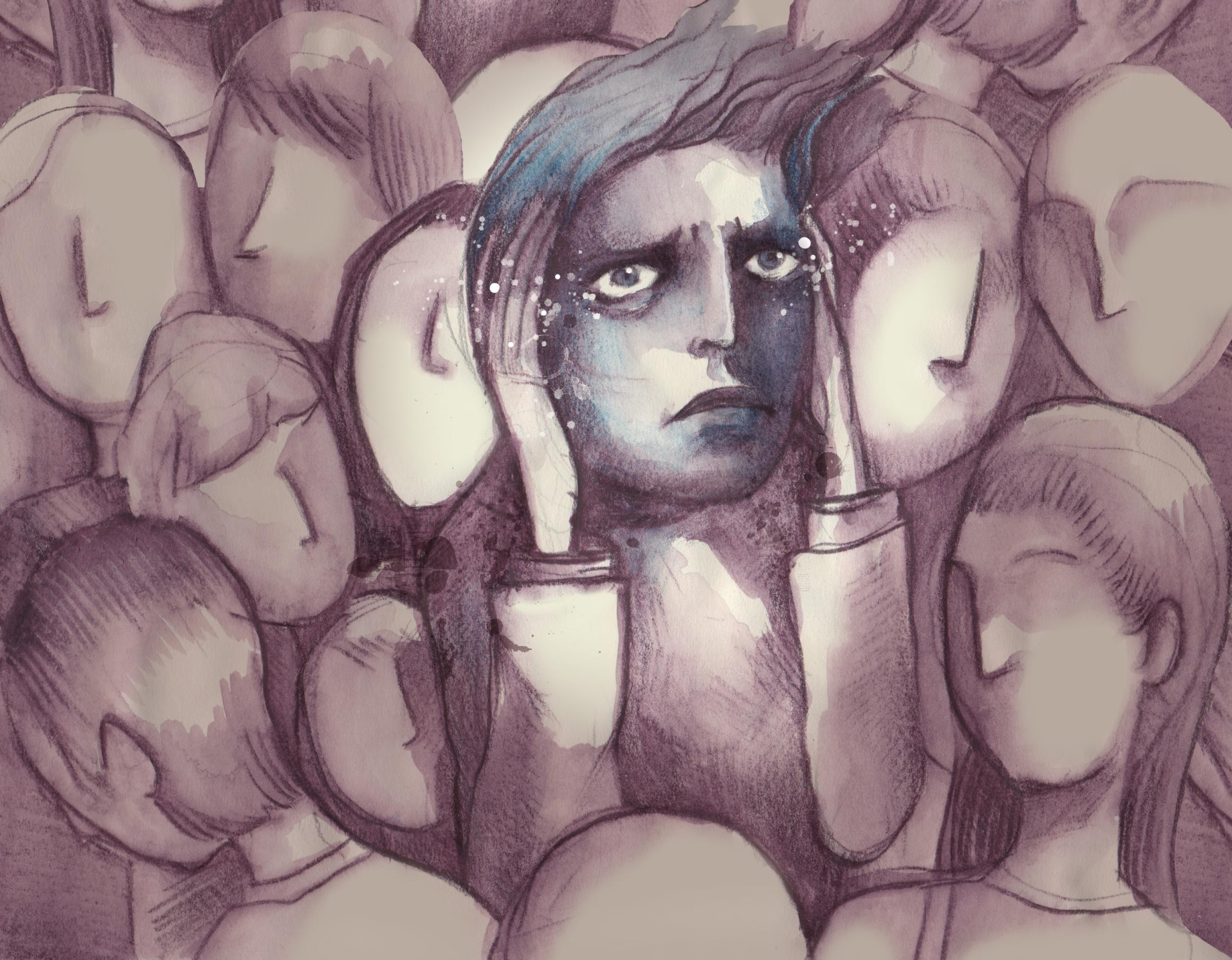'Hit by freezing water': People describe exactly what their mental illness feels like
'When I have a bad anxiety attack it feels like I’m drowning'

Your support helps us to tell the story
From reproductive rights to climate change to Big Tech, The Independent is on the ground when the story is developing. Whether it's investigating the financials of Elon Musk's pro-Trump PAC or producing our latest documentary, 'The A Word', which shines a light on the American women fighting for reproductive rights, we know how important it is to parse out the facts from the messaging.
At such a critical moment in US history, we need reporters on the ground. Your donation allows us to keep sending journalists to speak to both sides of the story.
The Independent is trusted by Americans across the entire political spectrum. And unlike many other quality news outlets, we choose not to lock Americans out of our reporting and analysis with paywalls. We believe quality journalism should be available to everyone, paid for by those who can afford it.
Your support makes all the difference.Every week, an estimated one in six people will have experienced a common mental illness, and one in four of us will have to deal with some kind of mental ill-health at some point in our lives.
Yet stigma still surrounds conditions including depression and anxiety, which are the most common in the UK, to bi-polar and anorexia. And just like with any condition - physical or mental - it is impossible to grasp exactly what a person is experiencing.
In attempt to melt away confusion and shame surrounding mental illness, we asked people to describe what their condition feels like in a way that someone who hasn't experienced it might be able to relate to. While their descriptions were all unique, they all shared one thing: encouraging others to seek help and an eagerness to raise awareness that no one should be alone when struggling with their mental health.
Catherine Bridgman, 24, from Norwich living in London. Photographer & PR Account Executive. She has experienced a number of major panic attacks.

“A major panic attack feels like you’re in immediate danger of dying. Sometimes it feels like you’ve been hit with a bucket of freezing water. Heart palpitations, dizziness, shortness of breath. It’s honestly terrifying and that only continues the vicious cycle of panic.
"The worst is when they seem to come on for no reason and you don’t even realise that what’s happening is anxiety. I get anxious on public transport or in crowds of people and it feels very realistically like I can’t breathe. It can be worse at the weekend when everyone on the train is chatting more because it feels like they’re voices are right inside my head, like an itch I can’t scratch."
Zoah Hedges-Stocks is a 26-year-old journalist living in London. She was diagnosed with depression and generalised anxiety disorder when she was 16.

“I had a full-on nervous breakdown leading up to my GCSE exams. When I have a bad anxiety attack it feels like I’m drowning. I’ll be gripped by sheer terror and can’t move. Sometimes there’s so much adrenaline buzzing through my body that I feel as if I must look like I’m vibrating.
"As a teenager, I’d also swing the other way into a depressive episode where I would feel utterly numb and flat. This flip-flopping between feeling everything at once and nothing at all was terrifying and I had to drop out of school before A-Levels."
Rosie* is 24-years-old. She is currently studying for a Masters degree. She has suffered with depression since the age of 13, and was diagnosed aged 18. Aged 20, she was diagnosed with anxiety disorder and panic disorders.
"A bad patch for me means feeling like a total prisoner. How as soon as he got to his car, all of the energy drained out of him and it took him a couple of days to feel normal again. When I'm in a bad patch, I'm constantly swinging between wide-awake nerves jangling and being so exhausted I can't move. My panic attacks are long and come with a lot of physical symptoms, including the 'heart attack' feeling lots of people describe, or the feeling when you nearly fall from missing a step as you come down the stairs and your heart is in your throat but that lasts for two hours. Being anxious about being anxious is a strange thing, but it becomes all-consuming, and you can't just avoid things which trigger anxiety, because it can be anything or nothing.
"I always laugh about the fact my first ever panic attack happened in Tescos, looking at socks. Most of the time, the only thing I can do is sit and wait for it to be over. I'm told it's virtually impossible to tell I'm having a panic attack because I tend to 'freeze'. You feel frightened to leave the house in case you have a panic attack, because you never know when it'll come, you just know it will. Even though I know I won't die, the fact my own body seems to betray me this way makes it difficult to trust that it won't betray me in other ways - through fainting, throwing up, or losing control of my bowels, which would draw attention to me and make it worse. It feels like anything is possible, but only the bad things.
Georgina Bobb is a 29-year-old freelance TV Production Co-ordinator and Managing Direct of TV Jobs UK. She was diagnosed with bipolar in 2012 after an incident which left her hospitalised for five weeks.

“I am now currently on medication and keep myself fairly well so do not currently experience the extreme highs and lows as I once did.
"When I did, which was over five years ago, the highs would be like extreme confidence complete fearlessness almost being inappropriately confident. The lows are what you call really low, as in you don't have the energy to move or do anything for days and sometimes weeks on end. The inability to look after yourself or do anything and the feeling of just utter despair and frustration as to why you cant do anything."
Frankie* is 26-years-old and based in London. She was diagnosed with anorexia in 2013, but had suffered from the condition from 2011.
“It really feels like you are in constant battle with yourself. There is the person who you really are, and the part of your personality that is ill and constantly dictating what you should do.
"This means you are basically feeling like you are constant failure. For instance, if you have dinner plans with your friends, which is always a stress because you are afraid of eating too much, if you cancel and let the disease win, a part of you is disappointed because you know you are disappointing your friends even though a part of you is proud that you have been “strong” enough to resist the temptation.
"If you are stronger than the disease and chose to go out, it leads to a constant feeling of guilt: 'Should I eat this or that? I am going to be heavier on the scale tomorrow? This is not worth it and I’m so weak'."
Lucia* is 26. She grew up in London and works as a freelance copywriter. She was diagnosed with depression aged 21, but had suffered for years prior.
"I find a good metaphor for depression that I have used to explain to people close to me, is kind of like being permanently hungover. You get up and feel like crap, you can’t be bothered to do your make up or find clean clothes because it takes all the effort you are physically capable of just to force yourself to leave the house. You consider calling in sick, but you need the money and you agreed to work this shift and you can’t let your workplace down.
You get to work, and people ask if you’re ok. “I’m fine.” You say. “I’m kind tired. Maybe I’m getting sick.”
You can’t tell them you’re hungover, because being hungover is not a valid excuse in the workplace. Being depressed is not a valid excuse in the workplace.
"The hangover comes in waves. At some points your fine and think great, the alcohol is out of my system. I’ll be fine now. But then half an hour later your feel ill again, your head hurts, your body is moving slowly, and you can’t concentrate on the task you’re doing.
“Maybe you should eat something?” someone suggests, but the canteen is too far away and you’re behind on your work, you need to catch up with everyone else so you don’t get fired. Like when people tell you to try exercise to help with depression, but the gym is too much effort, there’s no way you can make it there and still have enough willpower to do something as simple shower, or do food shopping, or pay your phone bill.
"Besides, eating something might well make you feel better, but it might just make you throw up. The gym might well make you feel better, or your substandard attempt at exercise might just end in abject failure and you’ll just hate yourself for not being able to do what everyone else seems to do with no problem.
"You go through the day, avoiding talking to people more than strictly necessary because oh god, your head hurts, and trying to pretend you’re not hungover - trying to pretend you’re not depressed – hiding it from your colleagues, is exhausting. You can’t wait to be finished with the day, to go home, to your bed and not have to act like you’re ok anymore, but the day is dragging. And you still haven’t done enough work. You’re definitely going to get fired if you keep on like this but you wonder “is that so bad? At Least I wouldn’t have to pretend I’m OK.”
"Eventually, the day is over and you’re in bed, ready to sleep, but all that coffee you had trying to keep yourself functional all day decides now is the time to kick in, and sleep isn’t coming. Where was this burst of mental energy all day when you needed it?! You toss and turn and try to numb your racing mind with Netflix and a cheeky bottle of something, and eventually, you start to nod off. You hope, as you begin to drift into a restless sleep, that you’ll wake up feeling better tomorrow, but you’re scared that you won’t. You’re beginning to think you’ll feel like this forever, and you’re not sure you want to keep trying. But you’re falling asleep now, so you don’t bother worrying. You’ll deal with the worry tomorrow. Once you’ve made it through the day again."
*Name has been changed
Join our commenting forum
Join thought-provoking conversations, follow other Independent readers and see their replies
Comments